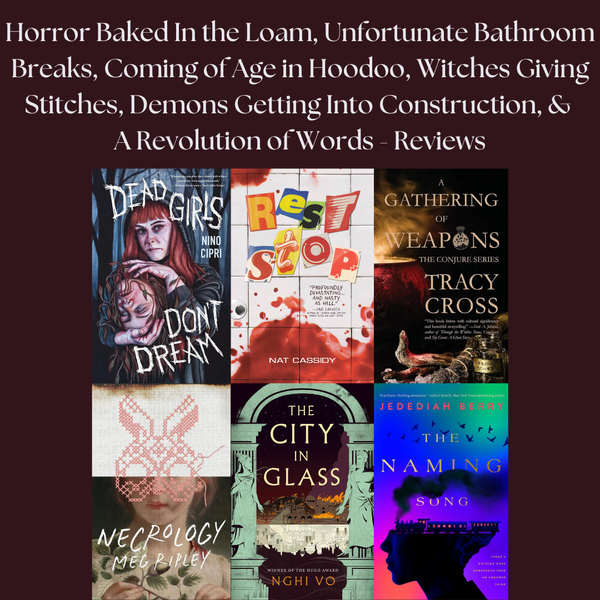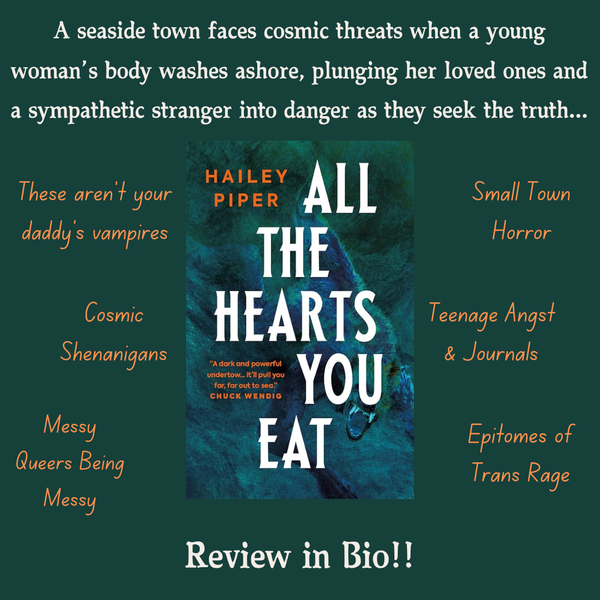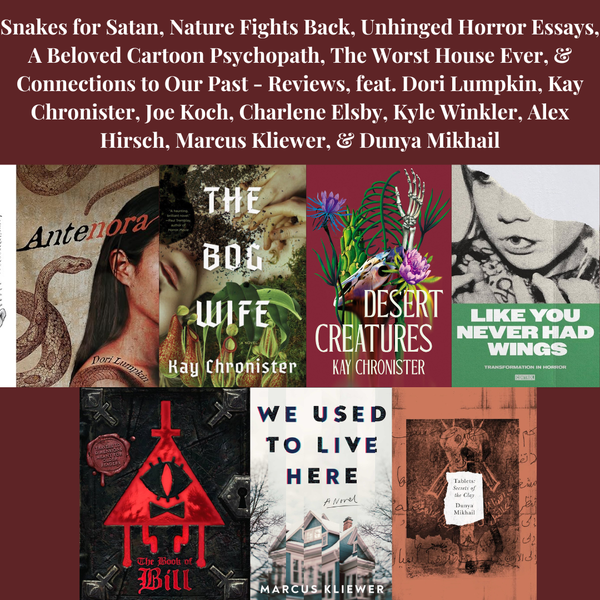Legacy, Anxiety, Neurodivergence, and Identity - The Endless Battle With White Supremacy - Reviews
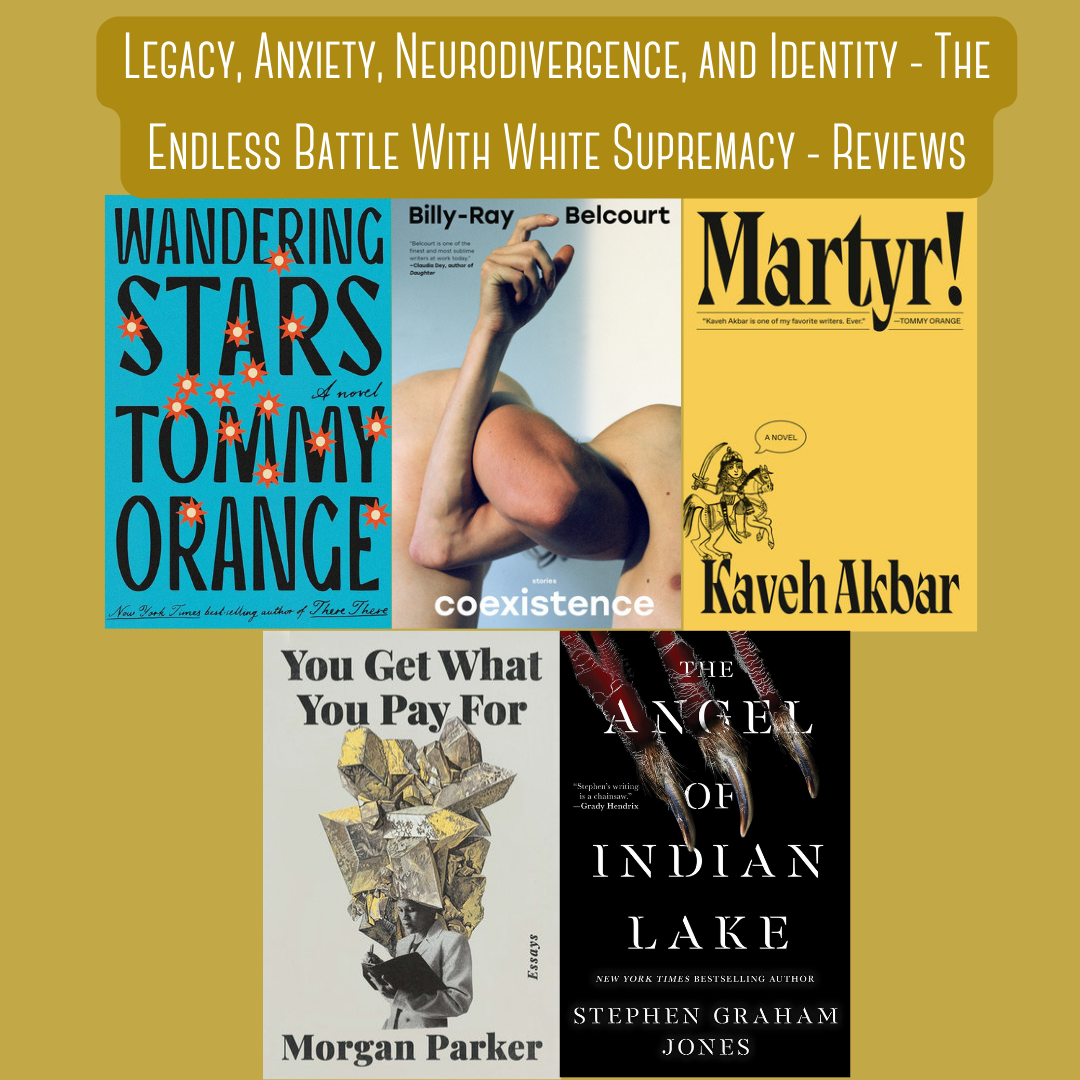
Strap in, folks, this one'll be a doozy.
Today's reviews are going to actually stray from the fairly typical horror content you can expect from me, as these are recent and upcoming literary and non-fiction titles...well, with the exception of Stephen Graham Jones. It will make sense, I promise.
Last week brought the release of Tommy Orange's much anticipated follow-up to 2018's absolute masterpiece, There There, a sweeping and fantastical family epic tracing the epigenetic and generational trauma experienced by several interconnected Indigenous characters in Orange County. To say that Wandering Stars is a book I've been excited to read would be a gross understatement.
Following in that books footsteps has been several others speaking in concert with the themes that appear in Orange's texts, and broadly in the prose written by any marginalized, and especially non-white, writers and thinkers alike. The most prevalent of these themes is the tenacity and destructive effects of white supremacy over the course of the past several hundred years.
What I hope to do in this piece is highlight what makes these titles so powerful and necessary to those doing the work of decolonizing their minds and coming to terms with the effects that white supremacy has had on all of us. In two of them I found experiences from my own childhood mirrored right back at me and it took my breath away.
Wandering Stars by Tommy Orange, Penguin Random House
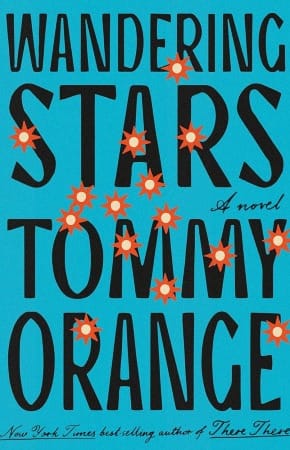
To say that Tommy Orange's writing altered my brain chemistry may sound like hyperbole, but I'm not joking in the slightest. There There took the intergenerational trauma narrative and set it ablaze with new life. Serving as searing social commentary, historical document, and cultural classic, with a sprinkling of magical realism, readers were introduced to characters seemingly on the fringes. The past and present in conversation by ways both beautiful and painful.
Wandering Stars expands its predecessor's scope, acting as both prequel and sequel as it begins with transporting the audience back to the very beginning of the family tree, at the Sand Creek Massacre of 1864, and how those ancestors moved through the assaults on their people and culture by white settlers, the Carlisle Indian Industrial School and further Christian assimilation, before returning to the present in Part Two.
However, despite this dichotomy of past and present, this book is ultimately concerned with Indigenous futures and how one may imagine or embody them while continuing to contend with present violence and erasure. Once we return to the present, we're following Orvil, Loother, Lony, Opal, and Jacquie Redfeather after the tragic events of the Big Oakland Powow. Orvil has survived being shot (thank whatever spiritual power, I was terrified at the end of There There) and has found comfort in the pain medication that staves off the star-shaped piece of shrapnel in his back. We're also witness to the effects of this event on the rest of the family, leading Lony down a path of self-discovery, attempting to connect further to his roots, while Opal and Jacquie do their best to heal and keep the family together as best they can.
We additionally follow the further stories of Richard Henry Pratt, the evangelical prison guard who directly connects to Jude Star and his ancestors, having formed the school that assimilates Jude and his son, Charles, as well as a young Opal Viola, setting Charles on his trajectory under the abuses at the hands of Pratt.
Wandering Stars is a masterful follow-up. Orange's command of not only language, but also storytelling and structure, presents something even more unique than his debut–a prequel/sequel that never eschews its earnestness to tell an easily palatable novel, but also offers enduring hope that seeks a future beyond white supremacy. The Redfeather's are a family anchored to one another despite the violence of centuries of oppressive and genocidal systems attempting to dehumanize, destroy, and separate them at any given step.
For fans of There There, this one may stay with you just as much as the former, if not more. Orange has further built upon what made his debut so powerful and engaging, leaving something that asserts his mission and charts a legendary career into the enduring future.
We could all learn so much from these novels and the truths they sing to us.
Coexistence: Stories by Billy-Ray Belcourt, W.W. Norton
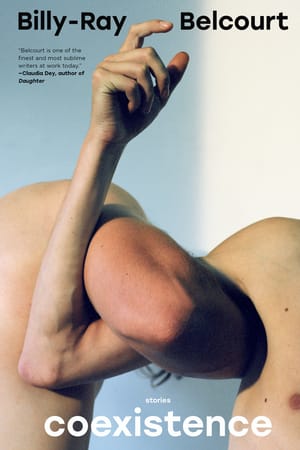
I almost feel like a fake fan for having no idea Billy-Ray Belcourt has a short story collection coming out. How I missed the posts about on Insta, I'll never understand. Unless I did see it and then lost the time/memory because of ADHD/Autism. OH WELL.
I just about had a panic attack of joy when I saw an ARC for this at work. Those of you who follow me know I just about never shut up about this writer, with good reason. Billy-Ray Belcourt–like Morgan Parker later in this piece–is one of my favorite contemporary poets (there's a lot of them because there is some great fackin poetry out there). Spanning genres and mediums, Belcourt has created an immense body of work in the last several years, taking Canada and colonialism to task in the process.
In Coexistence, there's a feeling of continuance from his spectacular novel from 2022, A Minor Chorus. The latter followed an academic as he tries to piece together what identity means for Indigenous folks throughout Alberta, while contending with his own. The kaleidoscopic scope of the novel carries over into the stories present here, with a series of semi-interconnected tales that are equally as powerful as they are heartbreaking.
A mother wishing to foster closer connection with her son, a poet whose marriage with his husband crumbling while he meditates on his career seeming to stagnate–each story reaches out for connection, for a hand to hold as the world seems to actively intervene from us reaching someone. Desire and duty get swept up in the maelstrom of life under late-stage capitalism, and Belcourt captures that desperation for solid ground perfectly. We experience the grief of these characters because we too are constantly facing the grief of living in a world that won't even allow us to tend to such sadness.
Especially following some of the most turbulent and isolating years of many of our lives, these stories and characters feel vital in our own attendance to those traumas and grieving that got left behind in favor "a return to normal." Do we even know what normal is anymore??!! Probably not, and this, in part, is Belcourt's point. Throughout his poetry, nonfiction, and fiction, our focus is consistently drawn to the violence and failures of white supremacy and colonialism on all of us. How queer bodies face their own grief, trauma, and mourning, amidst a seeming apathy surrounding us.
What Coexistence offers is a little bit of light, or, if not light, a sense of understanding. Some respite from the pain. A bit of connection when all feels lost. In jaw-droppingly gorgeous prose, we are granted those spaces for introspection. For love. And when this collection releases in May, I hope you will grant yourself the time to visit those spaces.
Martyr! by Kaveh Akbar, Penguin Random House
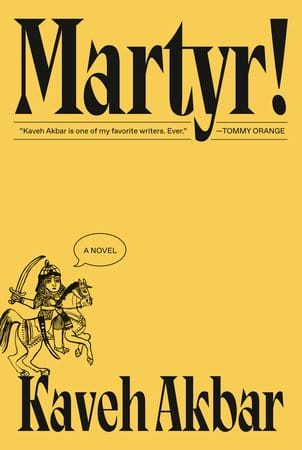
Kaveh Akbar is a fantastic writer you may not have heard of, especially if you don't read poetry. My initial engagement work came in 2022 when I read his collection, Calling a Wolf a Wolf, a rending series of poems about addiction, queerness, and Iranian identity in contemporary America.
I missed the initial announcements of his debut novel, but was excited when we got it at the store as I was a big fan of the aforementioned poetry collection. In Martyr!, we meet Cyrus, a young Iranian-American man contending with the road to sobriety, while also searching for meaning in a world that seems to consistently forget about or ignore him. After losing his mother to a US airstrike on a plane she was flying in, plus the later loss of his father, Cyrus grapples to understand the concept of martyrdom and how it connects to his own life. Like many of us, he wants his life, and eventual death, to mean something. He wants to amount to something in his writing, in his living, in his personhood.
When Cyrus takes a trip to New York to conduct a series of conversations with a dying artist, Orquidea, who brings him a sense of ease, but hosts secrets of her own. Perhaps she is the missing link to Cyrus's book about martyrs and martyrdom. This sets in motion a series of events that will change both of their lives forever. With sardonic humor, heart, and razor-sharp insight, Akbar allows us to witness Cyrus's growth and healing, while holding him in all of his complexities as he searches for the love and self he has yearned for for much of his life.
On a personal note, this book was the first of two times in the past few weeks where I read my experiences back at me. In the novel, we learn of a coping mechanism Cyrus uses where on particularly sleepless nights, he imagines imaginary conversations between important figures and figureheads throughout his life. It's a surreal and brilliant device to highlight ways in which he can synthesize ideas in a place that is not at the behest of capitalism and grind culture.
When I was much younger, I also struggled with an acute insomnia for quite a few years. Reading was often my way of passing the time, particularly turning to the comfort of my Calvin & Hobbes collections. What I also came to do was imagining my own adventures and scenarios for the character of "Spaceman Spiff," the sci fi alter ego of Calvin. I would often sit up in bed, side-table light on, quietly vocalizing these stories to myself. This would morph into pretend conversations and even "interviews" where I would talk about the subjects and ideas I perhaps felt too shy or shameful to discuss in the neurotypical and normative spaces I inhabited by day.
For myself, these moments were indicative of my neurodivergence, but I have found from peers and writings such as Akbar's, that this seems to be an experience shared by many Millennial, neurodivergent, and queer folks. Whether many of us are connected by neurodivergence or not, there is absolutely connection in how many of us who perhaps go against or eschew the "safety" of white supremacy can seek solace in moments of isolation, or even sleep, when the world was quickly accelerating toward late-stage capitalism and overwhelming neoliberalism/apathy in the face of global abuses from white supremacy and nationalism.
Despite my privilege of being a white AMAB child, I knew something wasn't right with the way our world operated. This only accelerated when I began reading works by Black feminists and queer authors amidst my own revelations of gender dysphoria, firmly pushing me from much of that inherent privilege that was awarded to me. I didn't want it but it was still there and I still have plenty of work to do in destroying the bits that did attempt to cement themselves into my brain.
For a character such as Cyrus, and a writer such as Kaveh, there is barely a pittance of safety from the violence of white supremacy, especially following the virulent xenophobia following 9/11. To read a shared experience within the anxieties of growing up through the 90's and 00's, one that I felt completely alone in, was an earth-shaking relief and moment of connection that I am eternally grateful to Akbar for.
Martyr! is a testament to how powerful a writer and thinker Kaveh Akbar is. Potentially one of the best books of the year, and in a fun bit of trivia, Tommy Orange and Akbar were in close contact while they wrote Martyr! and Wandering Stars. Being that both novels deal with addiction and sobriety, plus the colonial roots of these experiences, it makes perfect sense and I love that they were influencing each other along the way.
Please, do yourself a favor and read this incredible work. And his poetry!!
You Get What You Pay For: Essays by Morgan Parker, Penguin Random House
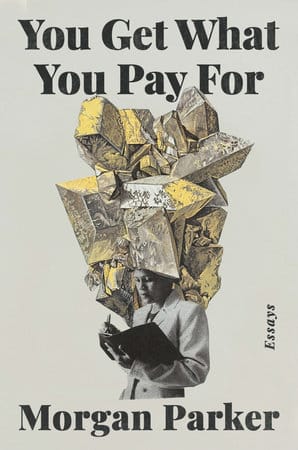
I'm running into the moment within this piece where I fear I'll veer into mere fangirl territory, so I shall continue to fight the urge. Morgan Parker is one of my favorite contemporary poets and thinkers. Whether it was discovering her mesmerizing collection, There Are More Beautiful Things Than Beyonce, in 2017, her follow-up, the powerful Magical Negro, the re-release of her debut, Other People's Comfort Keeps Me Up At Night, or her YA debut from a couple years ago, Who Put This Song On?, her voice and insight has not only inspired me in massive ways, but prompted me to ask further deeper questions concerning white identity and supremacy.
None of that changes in her first book of essays, You Get What You Pay For, offering even more space to consider the destructive and insidious legacy and history of white supremacy. Delving into her own experiences and pieces of history, the themes of her poetry roar with extraordinary power and insight throughout each piece. Considering theory, literature, and pop culture, readers are guided throughout history, contending with what legacy means for people who don't have as strong of bonds or resources to their histories and ancestry.
Referring back to "the boat" as a larger image to synthesize past, present, and future. It is an image that has caused immense suffering, but may also point to a sense of salvation. What does any of this mean in a country that continues to grind its heels into the dirt at the mere concept of accountability? How many times do we need to talk about white supremacy, and the fact that it harms ALL OF US, before we actually turn our gazes inward and work to dismantle the colonizers in our minds?
Parker speaks to all of this with her signature wit, righteous anger, and hopeful heart. Where much of You Get What You Pay For speaks to history, it is also a Millennial story. Anyone who grew up in the 90's and early 00's will recognize much of what Parker imparts. From the disarming neoliberalism of "post-racial" America, to the shows and music we all loved and love, there is a searing relatability throughout that sets the spotlight to just how much our collective human experiences are, but for marginalized communities, that universality gets lost in our collective prejudice.
Calling back to Martyr!, there is a section of this collection that connected deeply into me. Speaking of her childhood growing up in religious schools and institutions, Parker recalls nights spent wide awake, praying to God to make her different, worrying about the next days events and how she'll need to attend to other peoples feelings. Much like the section in Akbar's novel, this sounded exactly like my own experiences with insomnia and anxiety–though for me it was battling dysphoria and masking in public. The abject fear you feel, when you are someone who exists outside of the strictures of the dominant class, is utterly debilitating. I am privileged to have avoided direct violence from racism, but I have realized how much of a target I am in the eyes of white supremacy. To them, I am an expatriate in the most disturbing sense. My transness does not erase my privilege, but it assisted in my seeing that amongst the ruling class and tenets of white supremacy, I am not safe or even considered by those in power.
With this collection, Parker is asking readers to attend to the history, the legacy, the consistently weeping wound of white supremacy that we refuse to, but must attend to. Hers is yet another call to action, a plea against the inaction we continue to steep in. If you are reading as a means of "doing the work," then this is a book you need to read immediately.
The Angel of Indian Lake by Stephen Graham Jones, Saga Press
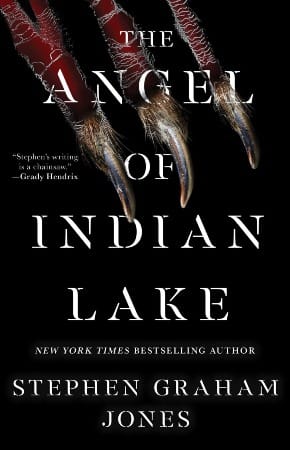
To end on a (semi?) high note, we end with one of March's most anticipated horror releases. Bringing the thrilling saga of Jade Daniels to a close, Stephen Graham Jones takes a graceful bow with The Angel of Indian Lake.
It's been a week and I'm still thinking through this book. Any ending to a series is going to feel bittersweet. Over three books we've seen Jade go through utter hell; what more can we put her through?? To answer your question honestly: both a lot and nothing?
Now, to say "nothing" is disingenuous here. A mere moment of humor. A LOT of shit happens in this book, but not all of it is brought upon Jade, or even because of Jade. I've been seeing a lot of complex and mixed reactions to this final chapter, and I can certainly understand why. SGJ is throwing each bedazzled egg full-force into the basket, presenting readers with a dizzying and often surreal adventure.
In a lot of ways that's kind of his point.
For many readers currently approaching, or even returning to horror in book form, they've likely been hearing SGJ's name a ton. He's the real deal and has had decades to prove that. This trilogy is often most people's introduction to his work and I think that might be part of why reactions can seem mixed. The Indian Lake Trilogy does highlight him at some of his absolute best, synthesizing a lot of his focus throughout his horror work. The man loves Slashers. It's his nerdy special interest, which is what initially drew me to him as a writer.
Part of the experience of a SGJ novel is the Afterward, where he often expounds on what brought him to this particular book, what works, writers, thinkers influenced him and said book. This always excites the academic bimbo in my brain. I loooove finding new theory and writing to consume. However, that's not typically everyone's experience or interest. Some people may not obsess over genre like I do, or even Stephen does. That's obviously totally fine.
Jade, as a character, is someone who has experienced a lot of trauma in her young life. She's been in and out of jail, killed her father while fighting the spirit of their towns lake, fought a tractor-trailer of a serial killer, and that's merely the surface. While Don't Fear the Reaper is probably the most streamlined of the trilogy, or where we may find Jade at her most "lucid," there is something to be said for the tone and structure of The Angel of Indian Lake feeling a bit closer to Chainsaw than Reaper. We're witnessing Jade as an adult who's attempting to live her life normally while completely abnormal shit continues to happen all around her. Of course that may cause her to see things a little more unilaterally than most of us do.
Having read quite a bit of the man's output of the last 20 or so years, I know he thrives in surreal and non-linear storytelling/imagery. It's a feature of his I adore, but again, is definitely not for everyone. This trilogy is essentially him sharing his special interest with us. Hell, I'm lucky I knew 99% of the slasher references in these books.
What I liken this final entry to is SGJ's 2006 behemoth, Demon Theory. Theory is truly the best word to describe this novel, as its a labyrinthine spiral into a maddening nightmare for a group of teenagers that loops, inverts, and is chock-full of annotations. It's also one of his longer books, so it may feel like homework to some, but god dammit do I love it. That said, being a very involved and passionate work will not always mean that it connects with readers, especially those looking for or expecting more commercial fare.
There is also something to be said in what this novel has to say about legacy, which is a word I've been throwing around frequently in this piece, I know. Not only Jade's legacy as a scrappy and tenacious final girl, but in her Indigeneity and connection to her mother and father, as well as the larger land of her town. It feels as though there's an even heavier focus on how Jade connects to her identity–in how she views herself within it and its connection to her status as a final girl. So much of the novel is her refuting her importance to the larger "plot," feeling as though she could never be a final girl. Whether that is directly linked to her own feelings of marginalization is presented in a crystal clear way, its evident that this larger conversation of what it means to embody and carry a legacy is a large portion of what this series has been aiming to present. Much like the breakout The Only Good Indians, legacy is always tied to and haunting us.
The Angel of Indian Lake is filled with immense care for the characters and world SGJ built over these three novels, and that care extends to the passion that he feels for this specific subgenre. It may not land for every reader, but I'm sure that everyone can/will appreciate the skill and artistry that went into its writing. You will laugh, cry, throw your hands in the air in bafflement, but you will also, most assuredly, scream.
Woof, that was a lot. These are books and topics that have fizzled and cooked in my brain for weeks, so I'm glad to have them out. If you read all of the reviews/the whole piece, thank you so very much for sticking with me there. I hope you found something that spoke to you, and most importantly, I hope it prompts you to read these books.
These are some of my favorite recent authors, so I wanted to be sure I did them justice. There are some other exciting titles coming up soon, so stay tuned!
Wandering Stars is currently available through Penguin Random House, and if Tommy Orange happens to come to your town at some point, try and see him! I hope to someday soon.
Coexistence: Stories will release through W.W. Norton on May 21, and you can find Billy-Ray on Instagram @nakinisowin.
Martyr! is currently available through Penguin Random House, and you can find Kaveh Akbar on Instagram @kavehakbar.kavehakbar
You Get What You Pay For is currently available through One World Publishing and Penguin Random House, and you can find Morgan Parker on tour! But also on Instagram @morganapple0.
The Angel of Indian Lake will release through Saga Press on March 26th, and you can find Stephen Graham Jones predominantly on Twitter @SGJ72.

